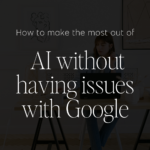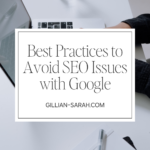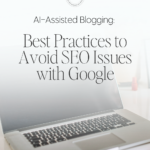
AI-Assisted Blogging: Best Practices to Avoid SEO Issues with Google
Table of Contents
ToggleSharing is caring!
Reading Time: 3 minutes


Artificial intelligence, or AI, is nothing new to content creation. Nowadays, it's normal for bloggers to use AI to write blog posts. Because content is much quicker to produce, optimisation becomes easier too. That's the reason why many bloggers are leveraging the power of AI.
But while AI is a helpful tool in blogging, it remains that – a tool. Although AI-generated content is not violating Google's Guidelines, it shouldn't be used to manipulate search rankings.
In April 2022, Google's Head of Searches, John Mueller, declared that AI-generated content is spam. It's unclear how Google will address AI-generated content in the context of SEO. Still, for now, AI should be used carefully to avoid violating the search engine's policy against spam.
How to make the most out of AI without having issues with Google or other search engines? Here are some best practices to keep in mind:

Best Practices to Avoid SEO Issues with Google
It's All About Relevance
While Google's John Mueller branded AI-generated content as spam, he also said that if the content is relevant and offers value to readers, it will still rank in the searches. Defining the purpose of the content is essential because the overall objective will attract readers. The tone of your content and the valuable information you will provide in a blog post matter the most. Your topic should align with your business goals.
Use the Right Prompt
Most AI content generators require a prompt like a keyword or a question to generate content. If the prompts are too general, expect the outcome to be robotic and vague.
You have to use a great prompt to create a good-quality blog post. Apart from defining the purpose of the content, you need to provide clear instructions and ask open-ended questions. Avoid typos and grammatical errors because these will confuse the AI tool. Add contextual information to the prompt and be as descriptive as possible for a more detailed answer.
Review AI-Generated Content
AI tools only use data fed to their systems, and there are bound have errors. You don't publish anything AI-generated without reviewing the content. Some facts will be off, so check for accuracy and relevance. There are cases when the content reads too robotic, so these must be edited to improve the delivery. In AI-generated content, spelling mistakes, typos, and other grammatical errors are common. Take time to correct these mistakes.
Check for Plagiarism
Stealing content is illegal, and if you're using AI, you have less control over the kind of content that comes from these tools. Some AI tools would use identical or similar content found on search engines because these systems get their infos online.
Many tools can detect plagiarized content, so check for originality and edit accordingly. You have to paraphrase the entire content to make it unique and engaging. This may be counter-productive, but at the moment, AI tech isn't perfect.
Check for Copyrighted Materials
One of the most common issues with AI-generated content is that these tools derive information from search engines like Google and Bing. Some systems cannot detect copyrighted materials and would use the said materials to provide content. This complicates the legality of using AI-generated content. The issue does not cover text content alone – even AI-produced images can rip off original artworks.
In addition, AI, without any human involvement, cannot be copyrighted. As AI use becomes a common practice, expect more copyright issues because there is no way to know if AI can produce original content and avoid copyrighted materials.
Check the Metrics
AI-generated content enables bloggers to produce content much faster, but as far as SEO goes, there's still no way to know how this will affect your marketing campaign.
For now, tracking the metrics is crucial to see if AI-generated content is affecting your marketing strategy negatively or positively. This helps determine if Google and other search engines are flagging your content as spam.
Measuring the metrics also determines the effectiveness of the content itself. You can check how many people are interested in a blog post and check for conversions.
Proofread and Edit for Engagement
AI-generated content reads very robotically or monotonously without editing, and the infos are not well-researched and often inaccurate.
You must check if the infos are correct, add more details, and edit the entire thing to maintain a consistent brand voice. It takes real work to make a well-written, informative blog post from scratch, and though helpful, AI content cannot replace content written by a real human being – at least for now.
AI is a great tool for blogging, but it shouldn’t be abused. Content creators shouldn’t depend on AI 100%. Many search engines have guidelines on using AI-generated content, and there is always the possibility of being penalised or sandboxed if any of these policies are violated.
It's best to use AI-generated content as a starting point, not the sole source of information. You cannot generate and publish content without reviewing it for accuracy and engagement.
Most Popular Posts:
Sharing is caring!
PLEASE COMMENT BELOW